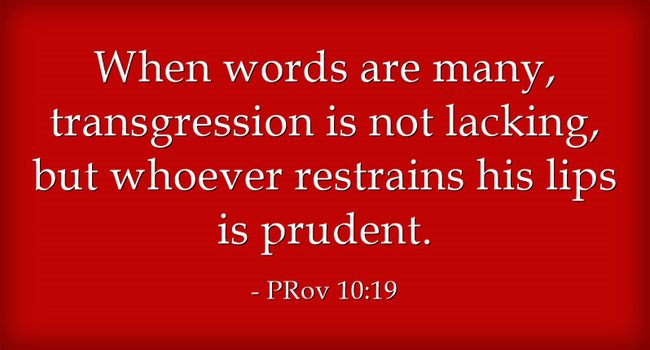What Does Prudent Mean in the Bible
What Does Prudent Mean in the Bible
What Does Prudent Mean? A Biblical Definition Of Prudent August 18, 2015 Jack Wellman
What does the word "prudent" mean when used in the context of Scripture? What is a biblical definition for prudent?
Prudent is…
Sometime it is better to say nothing at all than to say anything. That shows prudence, so the wise thing to do under certain circumstances could be to keep our mouths shut, especially if we're in trouble, and the only prudent thing to say might be, "I'm sorry." Someone who is being prudent is careful or wise in handling practical matters and is exercising good judgment or common sense. That is basically what being prudent is.
The Prudent Person
I can speak for myself when I say that I need to be more prudent but thankfully God has a lot to say about prudence to help me and I hope it helps you. Consider Proverbs 10:19 which says "When words are many, transgression is not lacking, but whoever restrains his lips is prudent" because "A prudent man conceals knowledge, but the heart of fools proclaims folly" (Prov 12:23). Fewer words are often more prudent, no doubt, and apparently Amos agrees as he wrote "he who is prudent will keep silent in such a time, for it is an evil time" (Amos 5:13). We sometimes react and even overreact when someone insults as by words "a fool is known at once, but the prudent ignores an insult" (Prov 12:16). Silence can be golden at specific moments in time.
The Non-Prudent Person
Just as prudence is an essential, quality characteristic, a person lacking prudence can do a lot of damage to themselves and to others, depending upon their position in life and who their responsible for. The captain of the Titanic comes to mind. He showed no prudence in his navigation of the giant cruise ship and ignored multiple warnings of icebergs and disaster followed and thousands died. We know for example that "The path of life leads upward for the prudent, that he may turn away from Sheol beneath" (Prov 15:24) but not everyone chooses that path. A foolish son "despises his father's instruction, but whoever heeds reproof is prudent" (Prov 15:5). Textbooks contain knowledge but time contains experience and experience can't be learned from a textbook. This is how the prudent of heart avoids certain catastrophes in their life as "The prudent sees danger and hides himself, but the simple go on and suffer for it" (Prov 22:3) just like the captain of the Titanic did and cost him his own life and many others souls with him.
The Prudent Recognize Danger
There is a great demand for prudence in this world and no more so than on jetliners, control towers, cruise ships, and passenger trains (what few there are left anyway). It takes great foresight and forethought to navigate extremely complex modes of transportation and it should because these positions have great responsibility associated with them and so "The prudent sees danger and hides himself, but the simple go on and suffer for it" (Prov 27:12). Sadly "The simple believes everything, but the prudent gives thought to his steps" (Prov 14:15) and so it is "The wisdom of the prudent is to discern his way" (Prov 13:8a). We can learn a lot from the ant who works all summer so that they can survive during the winter when food is sparse and so the ant "prepares her bread in summer and gathers her food in harvest" (Prov 6:8) as a prudent way to survive. This is basically what Solomon meant when he wrote that "He who gathers in summer is a prudent son, but he who sleeps in harvest is a son who brings shame" (Prov 10:5).
Conclusion
If you are wise or prudent, then you will chose to repent of your sins (turn away from them and forsake them) and put your trust in Christ and not in yourself. It is foolish to trust in yourself because "each of us will give an account of himself to God" (Rom 14:12) whether you believe in God or not since "we must all appear before the judgment seat of Christ, so that each of us may receive what is due us for the things done while in the body, whether good or bad" (2nd Cor 5:10) for Christ is "ready to judge the living and the dead" (1st Pet 4:5) and this includes the fact that everyone "will give account for every careless word they speak" (Matt 12:36). What will you do?
Article by Jack Wellman
Jack Wellman is Pastor of the Mulvane Brethren church in Mulvane Kansas. Jack is also the Senior Writer at What Christians Want To Know whose mission is to equip, encourage, and energize Christians and to address questions about the believer's daily walk with God and the Bible. You can follow Jack on Google Plus or check out his book Blind Chance or Intelligent Design available on Amazon.
Source: https://www.patheos.com/blogs/christiancrier/2015/08/18/what-does-prudent-mean-a-biblical-definition-of-prudent/
Posted by: brabynbort1980.blogspot.com
0 Response to "What Does Prudent Mean in the Bible"
Post a Comment